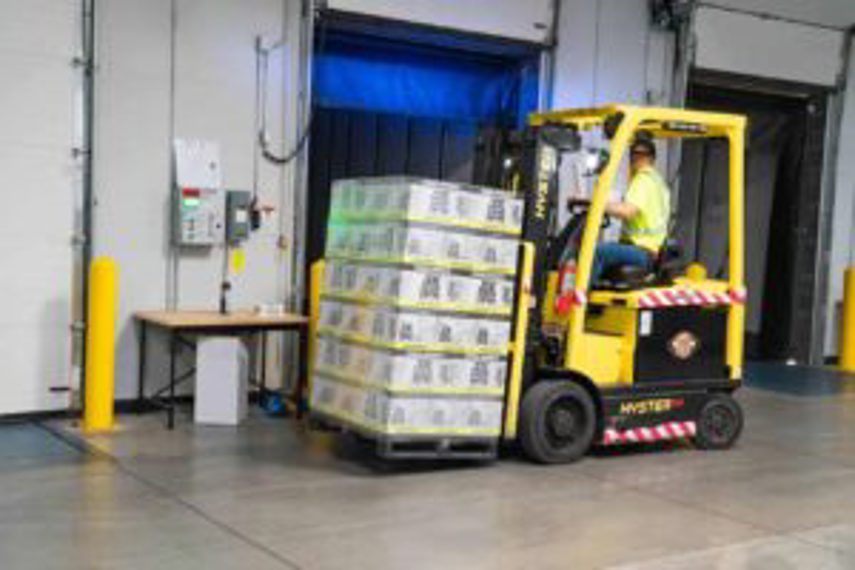
Wholesalers deal with large quantities of stock, meaning their needs are distinct from those of B2C retailers – and that precise inventory management on a large scale plays a central role in their business’ success.
Here we outline the 11 key steps wholesalers can take to manage their businesses successfully, from planning, pricing and staffing – to the crucial processes used for inventory management.
- Read more: Handle your wholesale orders with confidence
Steps for wholesale business management included in this article:
What is wholesale management?
Wholesale management involves the running of a business that sells goods wholesale – that is, in bulk at a lower price than retail. Wholesale customers then resell the goods – often to end consumers – after adding their own profit margin.
Wholesale businesses can be one of two models:
- The wholesaler purchases products in bulk from manufacturers and then resells those goods to a retail outlet
- The wholesaler produces its own products to sell direct to retailers, who then resell the goods on to consumers
The 11 Steps for Wholesale Management Success
Here we take a look at 11 key steps to help ensure the long-term sustainability – and success – of your wholesale business.
1. Have a firm wholesale business plan
Business planning is a cornerstone of wholesale business management. A good business plan is a roadmap to the future of your business, telling the story of what the business will achieve, how it will achieve this and when.
The three main reasons why your wholesale business should have a business plan is that it’s a smart tool for developing effective growth strategies, helps you determine future financial needs, and attracts investors and lenders.
The wholesale business plan should include:
- A mission statement. This is a summary of the company’s purpose, values, and goals. It answers the question of who you are as an organisation and what you stand for.
- Business objectives, including strategic, financial, operational, and marketing goals.
- An executive summary that provides an overview of the business, and a snapshot of the entire business plan.
- Products and services the business provides, and the perceived problems they solve.
- Analysis of your industry and your competition, including the business structure and details of your customers, suppliers, and partners.
- A market analysis and customer segmentation to determine who is your target audience - along with marketing and operational plans that outline tactics necessary to reach this audience.
- Your unique selling point; or the ‘why’. This is your value proposition that tells consumers what makes your products and services better than those of the competition.
 Making a business plan sounds obvious – but ensuring you have a robust plan that includes points like market analysis takes time and effort, including thorough market research
Making a business plan sounds obvious – but ensuring you have a robust plan that includes points like market analysis takes time and effort, including thorough market research
2. Establish your wholesale business pricing strategy
A robust pricing strategy is crucial to creating a profitable wholesale business and should factor in cost, wholesale price, and recommended retail.
Selecting the right price in wholesale business management is about maintaining a balance between sales volumes and profitability. The goal is to cover costs and create a sense of value for customers – and for you to stay competitive and ultimately profitable.
Wholesale pricing is based on the principle of selling bigger volumes at a lower markup. Typically, a wholesale business will offer retail customers a 50% discount off their regular retail price, allowing them to offer competitive prices to their customers, while also maintaining a healthy profit margin.
Because a wholesale business has less need for expensive marketing or maintaining physical stores, their operating costs are generally lower than those of retail. Wholesale businesses can therefore still make significant profits with lower margins.
3. Promote your wholesale brand
Wholesalers – just as much as retailers and B2C organisations – need to create brand awareness, because how else will your customers find you or know your brand?
Three key areas to focus on when promoting your wholesale business are:
- Attracting new wholesale customers
- Obtaining more orders from existing customers
- Increasing order size
Trade shows are a great way to promote your wholesale brand, because they’re industry-specific and targeted to the people and businesses interested and involved in your sector. In other words, the attendees and exhibitors at trade shows are already interested in what your wholesale business provides.
Automated ordering and shipping encourage more and larger orders from existing customers because it streamlines processes and makes it easier for retailers to place and receive their wholesale orders. It also provides you with the data to cross-sell and upsell to your customers - since you can make suggestions to your customers based on previous sales.
 Establishing your pricing method is crucial to ensure your business is sustainable, and this will need to take a range of costs into account
Establishing your pricing method is crucial to ensure your business is sustainable, and this will need to take a range of costs into account
4. Hire the right staff for your wholesaling business – and invest in them
Hiring the right staff is important in any business, and this is certainly no different for wholesale businesses. To ensure you are recruiting the right people you should first identify your business goals and build your team around these. Consider your long-term business objectives and plan onboarding, skills training, and succession planning in advance.
Evaluate the current situation with regards to existing staffing levels, skills, and performance. How are staff performing and where can improvements be made? What skills are important for necessary tasks to be performed? Are your current employees being offered opportunities to upskill or provide input into ways to optimise tasks and processes?
Answering these questions allows wholesale business managers to not only assess how well staff are performing, but also to determine any skills shortages – or even if staff feel adequately compensated or valued for their contribution.
5. Foster long-term relationships with stakeholders in your wholesale business
Stakeholders are those people that have a stake in your wholesale business. They can be customers, clients, staff, suppliers, or even board members – all of which are important to you wholesale business.
This means stakeholder relationship management is all about creating and maintaining mutually beneficial long-term relationships with all stakeholders – but particularly with your customers, suppliers, and employees.
Communication is key to the success of this relationship. Internal stakeholders are – as the name suggests – stakeholders within the business. For instance, employees are directly affected by business operations and should be treated as such. Companies need to ensure that all their teams are trained and aware of their part in the success of the organisation.
External stakeholders are those people or groups that have an interest in the success of the business but don’t have a direct affiliation with the products or internal operations of the wholesale business.
A supplier is an example of an external stakeholder. Building strong relationships with suppliers puts your wholesale business in a better position to react quickly to external challenges.
Working closely with suppliers can help wholesale businesses manage inventory and implement improvements across the supply chain - for instance, you might implement a vendor managed inventory system to streamline your supply chain, or even cooperate to bring new products to market.
- Learn more: Vendor Managed Inventory: The Complete Guide
 Invest in people. Not just your own staff, who are important to your wholesale business, but also your suppliers, whose input can be vital to your success
Invest in people. Not just your own staff, who are important to your wholesale business, but also your suppliers, whose input can be vital to your success
6. Maintain a healthy cashflow for your wholesale business
With inventory stock taking up a large percentage of a wholesaler’s capital, managing cashflow is crucial for a wholesale business. Positive cashflow is necessary for the business to run smoothly, pay its bills, meet customer demand, and make informed decisions about business operations.
The following activities will help ensure your wholesale business has optimal cashflow to maintain operations and to take advantage of future growth opportunities.
- Cashflow forecasting. This is a process where wholesalers predict sales volumes and expenditure for the financial year to determine the amount of cash the business will have on hand at any given time within that 12-month period.
- Cash reserves. Maintaining enough cash in reserve provides a wholesale business with the money needed to cover employee salaries and business expenses when customers fail to pay on time. This cash reserve will also help keep the business afloat if sales are low. By allocating a portion of monthly profits to a cash reserve a wholesale business can build up a reserve that covers three to six months of expenses.
- Invoice factoring. This business transaction immediately converts invoices into cash by selling accounts receivable to another company at a discount. Typically, 80% of the invoice values are paid in an upfront lump sum of cash with the remaining 20% paid when the invoices are collected.
- Demand planning. Effective demand planning enables wholesalers to meet customer demand while avoiding holding high levels of inventory stock. Inventory software solutions are a great tool to help establish accurate demand forecasting. Inventory software helps track stock in real time and provides detailed reports to enhance inventory management.
- Invoice processing. Prompt delivery and accurate invoicing is essential for managing cashflow, and also for maintaining a positive customer experience. Wholesale inventory management software can automate invoicing, eliminate human error, save time and reduce costs – all of which will improve cashflow.
7. Manage your wholesale business warehouse efficiently
Efficient management of your warehouses improves workflow in your wholesale business by providing easy access to products and improving packing and order fulfilment rates – which makes for quicker shipping and better overall productivity.
Automated inventory management technology along with RFID readers and barcode systems help to eliminate mistakes and will help to expedite the time it takes for products to get from your warehouse to your customers.
Wholesale business warehouses must have effective inventory software solutions because supplying to your customers on time via multiple channels can be challenging. An efficient system records all product data and its location in the warehouse, and improves pick-and-pack routes – reducing the time spent searching for items.
 When dealing with large quantities of stock, managing your warehouses efficiently can save your staff hours of work and speed up order fulfilment significantly
When dealing with large quantities of stock, managing your warehouses efficiently can save your staff hours of work and speed up order fulfilment significantly
8. Batch or serial track products your wholesale business distributes
Batch and serial tracking – as the name suggests – enables a wholesale business to trace batch lots, serial numbers, and expiry dates. It’s particularly valuable for wholesale business management in the food & beverage industry, which often deals with perishable goods with short expiry dates and limited shelf life.
Batch tracking enables wholesale businesses to track product lots along the supply chain – from manufacturer to distributor and retailer and then finally, the customer. Inventory management software provides accurate, detailed, real-time data, visibility, and transparency – which will optimise batch-tracking activities and help reduce or eliminate product errors.
In the unfortunate event of a defect in your product, you’ll also be able to identify the specific batches that require recall.
- Learn more: Unleashed Batch Tracking
9. Set up B2B eCommerce for your wholesale business
Wholesaling businesses need to understand how eCommerce is creating new demands on their business, and how they can adapt to these. B2B eCommerce offers plenty of wholesale business advantages in terms of time- and money-saving potential. Automating as many processes, workflows, and tools as possible reduces the need for manual labour and minimises costly errors.
Setting up a B2B eCommerce channel for your wholesale business makes sense because bulk discounts are part-and-parcel in the wholesale industry. A recent report by Aberdeen found that the top-performing B2B eCommerce businesses were 70% likelier to use automation for invoicing, payments, customer service (chatbots), and contract management than less profitable wholesale businesses.
You can lay the foundation for eCommerce growth by choosing the right tools to automate and streamline processes. For instance, you can implement an eCommerce system and inventory software – such as Unleashed’s B2B module – that integrates with other business software and is scalable to grow with your wholesale business. It’a also a good idea these days to offer a variety of ways for your customers to pay.
- Learn more: Unleashed B2B eCommerce Store
 Inventory management is central to wholesaling, and the best option to manage this is purpose-built inventory software, which is now available in affordable formats like cloud-based SaaS systems
Inventory management is central to wholesaling, and the best option to manage this is purpose-built inventory software, which is now available in affordable formats like cloud-based SaaS systems
10. Use inventory management software for wholesale
Fundamental to any wholesaling business is effective inventory control. Wholesalers generally hold significantly more stock than their retail customers and a large amount of investment and cashflow is tied up in that inventory stock. That means managing inventory well is crucial to the overall success of a wholesale business – from storage to shipping to customer service and stakeholder management.
Automating inventory management in your wholesale business will improve its competitiveness, which is crucial to wholesalers that deal with large quantities of inventory stock. Software helps to manage wholesale purchases, sales, shipping, and tracking. Using purpose-built inventory software will increase inventory accuracy, speed up order fulfilment and enable faster responses to changing customer needs.
Automated inventory solutions will also help with meeting demand – with features like automatic stock alerts when SKUs drops below predetermined thresholds and takes into account factors like lead times.
11. Be ready to adapt your wholesale business when needed
OK, this last point's not really a 'step', but we thought we'd include it here anyway, since it's such a crucial factor for any business that has to manage inventory.
The supply chain disruptions of the last two years have taught every business the need to be flexible. The ability to respond, adapt and reposition against external challenges has never been more important.
One of the biggest challenges wholesale businesses will start experiencing is the growing demands of B2B customers, who increasingly expect to be treated like B2C buyers – especially when it comes to expedited shipping and fast turnaround times.
B2B customers no longer want to wait for goods and services, and this demand for expedited delivery can filter up the supply chain from retailers and distributors back to wholesalers and manufacturers.
People want things fast. The opportunity wholesalers have is that with a wholesale business there are generally fewer customers, meaning there is an advantage to be gained through shipping in bulk, which can reduce fulfilment and shipping costs. Shipping using pallets and crates instead of individual orders also minimises manual handling of individual tasks.
Manage your wholesale business with Unleashed
There are many ways for wholesalers to cut costs and implement effective processes, but a single key practice that covers many of the points we’ve made above is using a cloud-based inventory management system.
Unleashed includes its own dedicated B2B module so you can manage your online B2B sales with ease – but it also integrates with popular eCommerce platforms like Shopify and Amazon, so you have the flexibility to choose how you run your online sales.
And since it’s a cloud-based SaaS software option, you’ll need minimal investment to get started – and it comes with ongoing support, updates and online training.
- Learn more: The next evolution of inventory management
